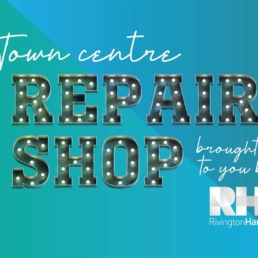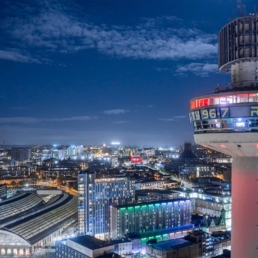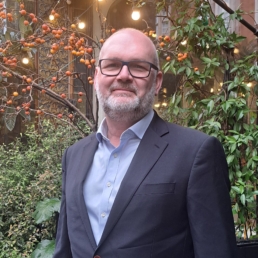This article appeared in React News on 9 March 2022. View the original article here.
React News spoke to RivingtonHark, strategic advisor behind Redical's £120m Victoria Leeds purchase, on the right time to buy and regenerating UK towns.
When newly launched investor Redical made the £21m purchase of Clayton Square Shopping Centre in Liverpool last September, its first in the UK shopping centre market, the company made it clear the deal would be the first of many. RivingtonHark was appointed as strategic advisor, to field opportunities and help Redical build a portfolio of UK centres on a buy-and-hold basis. Few expected the duo’s second purchase after the £21m Clayton Square to be the £120m Victoria centres in Leeds, a shopping district which is one of the North’s premier retail destinations. The sale included the 200,000 sq ft Victoria Quarter shopping gallery, bought by Hammerson for £136m in 2012, and the neighbouring 400,000 sq ft Victoria Gate shopping centre, built for £164m in 2016.
React News spoke to RivingtonHark’s executive director Mark Williams on buying at the right point in the cycle, plans for the Victoria centres, and regenerating town centres across the UK.
What drew RivingtonHark and Redical to buy the £120m Victoria centres?
It’s really an estate. It’s two arcades under the banner of Victoria Arcade. Anchored by Harvey Nichols, with Louis Vuitton, Vivienne Westwood, Paul Smith, as well as The Ivy Asia about to open. And then we have Victoria Gate which Hammerson built alongside. The build quality of that is stunning. It is the best architectural quality shopping centre in the UK bar none. The brickwork on the outside fronting the market is unbelievable. There was no expense spared to make it brilliant.
For us, it’s about evolving it. It is a quality destination. It’s like the London estates, if you think of Marylebone High Street, Burlington Arcade, parts of the Kings Road. It’s not a shopping centre in a traditional sense.
What changes are you planning to make?
We are definitely going to be focusing on improving the quality. We’re going to bring in more food and beverage. So Ivy Asia will be the first to open, and we’ll then be looking at potentially a bit more leisure that links to that. We’ve got a meeting with all the occupiers later this month to hear their views, both local and national, to show that we are not coming there with fixed views. We’ve got a big marketing spend. We want to make sure that what we do is directed at your customers, it has an impact on you. Right now we’re on listen mode. But we’re going to invest, we’re going to improve. And then we have the Wrays Building, which is a listed building connecting the two and there’s a public area. We’ve got meetings with the council to talk about how we can improve the external space, which is theirs, not ours, and how we can animate the buildings so that people can go around and feel comfortable.
“It’s not about knocking down anything. We’ve bought it at a point in the economic cycle where we can afford to improve and invest”
It’s not about knocking down anything. We’ve bought it at a point in the economic cycle where we can afford to improve and invest because the price we’ve paid is throwing off a reasonable yield. The beauty of a corporate purchase is that the yield as I’ve seen quoted versus the yield we are getting, there’s quite a big difference as in corporate transactions you have fewer costs and completion accounts. So we are well into the eights on the yield we’re getting. It’s a good deal and we’re going to hold it long term.
When Hammerson’s £160m Victoria Gate opened in 2016 it was hailed as architecturally world leading and was anchored by the largest John Lewis outside London.
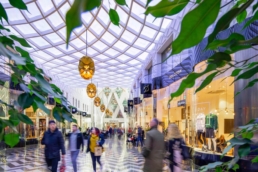
What other parts of the market does RivingtonHark focus on alongside the partnership with Redical?
I’m going to say we’re unique, though that’s always quite a dangerous thing to say. Roughly half our business is as consultants to the public sector. We are building over £200m of construction onsite as we speak. Swansea Arena opens at Copr Bay later this week. Chester Northgate opens later this year, with a new market hall, cinema, and more. So we do a lot for the public sector. We then also have the value add strategy, which owns St John’s Shopping Centre in Liverpool with AnaCap, where we also co-invest, and then we have our work with Redical where we are the strategic advisors. We’ve basically been working with them to devise, identify and execute a strategy for investments. We do the whole spectrum from knocking down development through to repurposing of existing assets, both for the public sector and for the private sector. The key to all of this is that we work hand in glove with all stakeholders because we understand how local authorities think and work, and therefore we have no disputes with any local authority. We work collaboratively with them. We are helping create and improve their places.
“We work hand in glove with all stakeholders because we understand how local authorities think and work”
Let’s talk about your role with Redical and the ambitions of the partnership to not just stop at the Victoria centres?
We were chosen as their strategic advisors because our geeky subject is UK retail town and city centres. That’s what my business knows intimately. We might be boring at a dinner party, but that is our chosen subject. We have the investment, development, asset management, placemaking skills, so we can look at it in a very holistic way. We are very cautious and we are very focused on the downside, always asking what can go wrong – what are the risks? The upside will take care of itself. Because in everything, something will always go wrong with a project.
We are entirely focused on being cautious and being risk-adjusted in our judgements. Right now, most pension funds don’t want to invest in direct property because they don’t want to have the management hassle around rents. If we can underwrite, we are capable of doing the heavy lifting, the asset management, the running of it. And that then offers the investors a stabilised return on a long term basis, which on a risk-adjusted basis offers good value.
It’s a sector that most funds are running a mile away from, but we think there’s an opportunity there.
Redical advised by RivingtonHark bought Liverpool’s Clayton Square for £21m in September
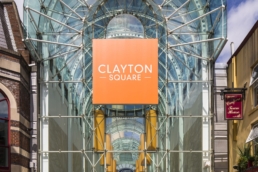
What sort of portfolio would you look to build with Redical?
We’re selective. So if we had the opportunity to buy at today’s market pricing four or five assets that fit the criteria, we’d do it. We have the capacity to do it. We’ve about to announce next week a further recruit. So we’ve resourced up and the ambition is to do that. Now, of course you don’t get four or five perfect things landing like that. So you have to be patient, and we have been patient. But if there are opportunities that arise, we will go and investigate and look at them. If they fit the criteria, then we’ll bid for them. And if they don’t, we won’t.
What was the thinking behind the Leeds acquisition?
We’ve been working with Redical for over 12 months, trawling every town, every city, every asset. Working out whether is it a yes, a no, or a maybe. Can we add value to it? Are the fundamentals right? We’ve looked at assets where we formed the view that people are only going to that town centre to work in either local authority offices or to shop. Now there’s a risk that with the internet, people won’t carry on shopping to that extent. I don’t know if that will happen or not, but that’s a risk and a risk that we won’t take with this fund. Whereas Leeds, people work in Leeds, people live in Leeds. More people are coming to Leeds, for tourism, or students. Then they also shop, so it’s an add-on.
RivingtonHark is also advising Cheshire West & Chester Council on Chester’s Northgate.
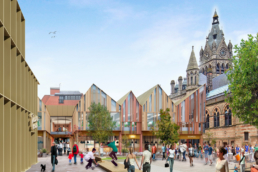
Does your focus on adding value tie into the locations you go for, such as Chester, Liverpool, Leeds, Swansea and beyond, especially with your council advisory hat on?
Yes. There’s a limit to what you can do. In our world, we are rooted in real estate. So we get involved in places where our activity can make a deference. There is no point in us getting involved in a place where there are factors of such a scale that’s actually what’s happening in the town centre is irrelevant. Underlying everything we do it is a belief that human behaviour and humans’ attitude to life is improved, is better, if they think the environment they’re working in, they’re living in, they’re visiting is nice. People in Newcastle, what they want is very different to what somebody in Leeds would want or somebody in Liverpool. They want their place to look like it is, they’re proud of their heritage. So it’s respecting the heritage, but it’s making sure those places are enjoyable.
What sort of work has needed to be done in some of those locations to deliver regeneration?
In Swansea the damage was done over 75 years ago. Basically the bombing of Swansea and the rebuilding in the sixties created a concrete mess. And the council have been trying to get the private sector to change that for over 30 years. We’ve actually delivered change, which the private sector failed to do for so long.
“We are entirely focused on being cautious and being risk adjusted in our judgements”
Chester’s totally different. Chester had a horrible shopping centre that wasn’t contributing. So we are improving listed buildings and adding uses. And then Newcastle it’s about curating all the streets. We’re not touching a physical inside of a building. There’s a pedestrianisation, an improvement of the side streets that go to the universities to make the connection better. Everything we do is made so that the customer, when they go round, they go, “I think this is better.” In Liverpool, we’ve got two great assets that are right at the heart of the city centre. We worked with a local authority over the partial pedestrianisation, tree planting. We’ve put in a massive green wall. St John’s is 55 years old, it is a concrete 1960s shopping centre. But we have made it greener, more sustainable. It’s better and nicer, but I can’t change it into an award-winning 2020 building. But it’s a darn site better than it was 10 years ago.
RivingtonHark has co-invested with AnaCap to buy the 540,000 sq ft St John’s Shopping Centre in Liverpool.
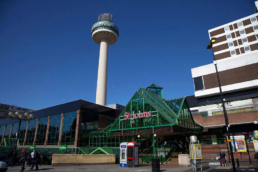
You’ve also got the strategy with AnaCap, what else will you be looking to acquire as part of that?
With AnaCap, that’s a value-add strategy. Value add is arguably the hardest to fill because you can look at assets that are throwing o! a high yield and go this is great, I can buy in. But actually there’s a reason it’s a high yield, because the cash flow is haemorrhaging. Also on a value add, you have to find your exit. So buying an asset that actually you ask, in three years time who’s going to buy it? You can’t just think, well, somebody else like me. They’ll want a similar return. So you’ve got to factor the exit yield being roughly the same as the entry yield. It makes it hard and we’ve got to create value. We are looking at things, but we’re not about to announce anything right now.
What are the risks or potential thunder clouds in terms of the retail market at the moment? What do savvy investors and asset managers need to be aware of?
It is making sure that you think of the retailers. There’s a need for retail space where people continue shopping there because they want to shop there. I’ve said this before, it’s 2008/9, the mass use of the smartphone, which is what triggered it. Prior to that, if we wanted to go and buy things, we had to go to shops to do it. Since then, we go to shops if we want to go. So, that switch from “have to” to “want” encapsulates everything I’ve just been saying. Convenience locations will continue to function, because they’re convenient. They’re easy. They’re transport length or they’re local. They might look pretty grotty, but they’re convenient. They’ll carry on. Fashion is where it becomes risky because you’ve got locations where people will ask, why do I want to go into that town to shop for fashion? It’s not a nice town, that’s the only reason I’m going in there, and actually I can do that somewhere else that’s better. Those places I’d be very nervous about. Hence we like Leeds because people go to Leeds because it’s a great place to go. It’s a great day out.
Latest News
January 23, 2026
A Busy 2025 for RivingtonHark
January 12, 2026
Strong 2025 Performance at St Johns, Liverpool
January 9, 2026

